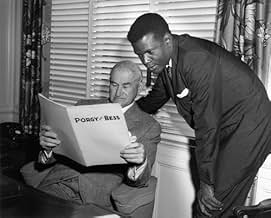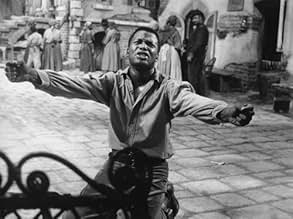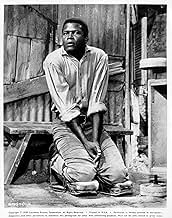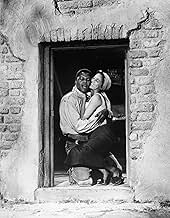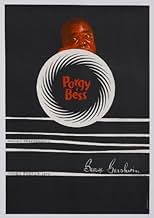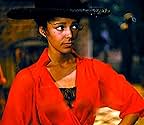A woman whose past is scorned by nearly everyone around her meets a man who'd love her regardlessly - if only everyone else would allow them to.A woman whose past is scorned by nearly everyone around her meets a man who'd love her regardlessly - if only everyone else would allow them to.A woman whose past is scorned by nearly everyone around her meets a man who'd love her regardlessly - if only everyone else would allow them to.
- Won 1 Oscar
- 4 wins & 10 nominations total
Featured reviews
I had the privilege recently of viewing what is said to be the last 35mm, Technicolor, stereo print and found it much livelier and more touching than remembered. Also closer to the original material -- basically, all screenwriter N. Richard Nash did was trim, change much recitative to spoken dialog, and insert a transitional scene or two (including a very amusing one for Pearl Bailey). Oliver Smith's production design is stagy in the "Li'l Abner"-"Guys and Dolls" '50s adaptation mode, but it works well for this work's folkloric, unrealistic quality. Stereotyping and racism are present, but not to a wince-inducing degree. Further, for a movie of its time, it's pretty frank -- the adultery, violent behavior, drug use, and self-destructive habits of the denizens of Catfish Row are not at all minimized in the telling. But there are debits, beginning with all that variation from the stage text. The loss of so much compromises Gershwin's brilliance -- no wonder the family doesn't like it. The reorchestration, especially of Sammy Davis Jr.'s material, is disconcertingly trendy and vulgar. George knew what he was doing, folks; you didn't have to mess with it so much. And while Poitier and Dandridge act well and their singing doubles sing well, there's a huge chasm between the characters' singing and speaking voices -- you're constantly aware of the artifice. What really counts here, of course, is the music, among the greatest ever written for the theater, anywhere. Despite all the tinkering, it survives,and you'd have to be made of stone not to be moved by it. If the treatment isn't entirely to the estate's liking (and it shouldn't be), there's still no reason not to spend some bucks to restore this ambitious filming of Gershwin's masterpiece and make new generations more aware of his genius.
The Seattle International Film Festival was fortunate enough to arrange a screening of a recently discovered 70mm print, going so far as to fly it in from Germany. It was a bit faded, the sound could stand to be remastered, scores of frames are missing, and it has German subtitles, but all in all it was a special treat to see a film unlikely ever to be made publicly available again.
But I'm rather mystified as to why the rights are still in dispute. There's nothing overly offensive here, neither politically nor artistically. Unfortunately, neglect and apathy are probably to blame... it must be said that, while notable, the film itself fails to fully communicate the passion of this most American of operas. It's more of a historical artifact now.
The audience was most delighted by Sammy Davis, Jr. in a role that seems to have been conceived specifically for him. Rarely has an actor been so perfectly suited for a part. Unfortunately, Mr. Davis' persona eventually overwhelms the character- but one can't be certain if this is due more to his actual performance or to the peculiar place our image of him now occupies in popular culture.
Sidney Poitier was 10-15 years too young for Porgy, but acquits himself nicely (though he is dubbed less than precisely). Dorothy Dandridge is just right- but is denied Bess' climatic scene, which takes place offscreen. Best of all is Pearl Bailey, who gets only a few chances to make an impression but takes full advantage of them. The scene in which she is interrogated by the policemen is so funny, it practically derails the movie.
The songs have been pared down, some making only a cursory appearance, and the staging is static. These choices, commercial in nature, rob the film of the power it should have. Perhaps another movie will one day do justice to the opera.
In this "Porgy and Bess", the portrait of Catfish Row is what is most moving. This community mourns, celebrates together and protects itself from outsiders. When the detective grumbles "nobody lives here", it's quite apparent why the inhabitants of Catfish Row would want him to believe that.
But I'm rather mystified as to why the rights are still in dispute. There's nothing overly offensive here, neither politically nor artistically. Unfortunately, neglect and apathy are probably to blame... it must be said that, while notable, the film itself fails to fully communicate the passion of this most American of operas. It's more of a historical artifact now.
The audience was most delighted by Sammy Davis, Jr. in a role that seems to have been conceived specifically for him. Rarely has an actor been so perfectly suited for a part. Unfortunately, Mr. Davis' persona eventually overwhelms the character- but one can't be certain if this is due more to his actual performance or to the peculiar place our image of him now occupies in popular culture.
Sidney Poitier was 10-15 years too young for Porgy, but acquits himself nicely (though he is dubbed less than precisely). Dorothy Dandridge is just right- but is denied Bess' climatic scene, which takes place offscreen. Best of all is Pearl Bailey, who gets only a few chances to make an impression but takes full advantage of them. The scene in which she is interrogated by the policemen is so funny, it practically derails the movie.
The songs have been pared down, some making only a cursory appearance, and the staging is static. These choices, commercial in nature, rob the film of the power it should have. Perhaps another movie will one day do justice to the opera.
In this "Porgy and Bess", the portrait of Catfish Row is what is most moving. This community mourns, celebrates together and protects itself from outsiders. When the detective grumbles "nobody lives here", it's quite apparent why the inhabitants of Catfish Row would want him to believe that.
This was/is an incredible movie, with incredible cast, music, singing, story, etc. It is a tragedy that some arrogant families (the Gerswhins or Premingers) can keep it from being available to generation after generation. I have wanted to see it again all of my life. I just found this site and read why it has not been available. Shame on these families for their pettiness. My wife is from Germany and she has never seen the movie. Neither have my step-children or my grandchildren. It is very sad that a movie of this depth and quality is not available for them to see. Where do these families get off making such a conceited, self-important, egotistical, condescending decision to prohibit generations from enjoying this film, these stars, these performances, this music! Release the video and let them world judge and enjoy!
Middling adaptation of the Gershwin opera is hampered by Preminger's decision to shoot entirely in long shot and forego close-ups. It keeps the audience from becoming deeply involved in the story.
Poitier does a good enough job as Porgy but the obvious dubbing of someone with a far deeper voice than he for the songs diminishes his impact. Dorothy Dandridge, Pearl Bailey and Sammy Davis Jr. all have more success with their characterizations but again the camera's distance and the obvious sets are no help to them.
The amazing music makes it worth watching once but the film is a disappointment.
Poitier does a good enough job as Porgy but the obvious dubbing of someone with a far deeper voice than he for the songs diminishes his impact. Dorothy Dandridge, Pearl Bailey and Sammy Davis Jr. all have more success with their characterizations but again the camera's distance and the obvious sets are no help to them.
The amazing music makes it worth watching once but the film is a disappointment.
I saw this movie when I was a kid and have been looking for it ever since.It rates up there with Cabin in The Sky, Stormy Weather and Carmen Jones as a must see in movies that showcased the awesome talent of African Americans.In the 60s the local Los Angeles TV stations would have a movie of the week and some stations would show the same movie for 5 days.Porgy and Bess was one of them and my whole family would be there all 5 nights in front of the TV and only moved on the commercials.South Pacific,Oklahoma and The Sound of Music are all musical classics that you can pick up at any video store. It would be a shame to let this collection of some of the best talent America had to offer be forgotten or locked in a vault.Please make the film available to the public.
Did you know
- TriviaSidney Poitier's singing voice was dubbed by opera singer Robert McFerrin (father of pop singer, classical conductor, and composer Bobby McFerrin).
- Alternate versionsAlthough this film has never been officially released on any home media format, numerous bootleg copies, running 115 minutes, are available on VHS and DVD-R. The full-length original version runs 138 minutes, not including overture and entr'acte music.
- ConnectionsFeatured in Biography: Dorothy Dandridge: Little Girl Lost (1999)
- SoundtracksSummertime
Music by George Gershwin
Lyrics by DuBose Heyward
Sung by Loulie Jean Norman and Women's Chorus
- How long is Porgy and Bess?Powered by Alexa
Details
- Release date
- Country of origin
- Language
- Also known as
- Porgy und Bess
- Filming locations
- Stockton, California, USA(Venice Island - picnic sequence)
- Production company
- See more company credits at IMDbPro
Box office
- Budget
- $7,000,000 (estimated)
- Runtime2 hours 18 minutes
Contribute to this page
Suggest an edit or add missing content

